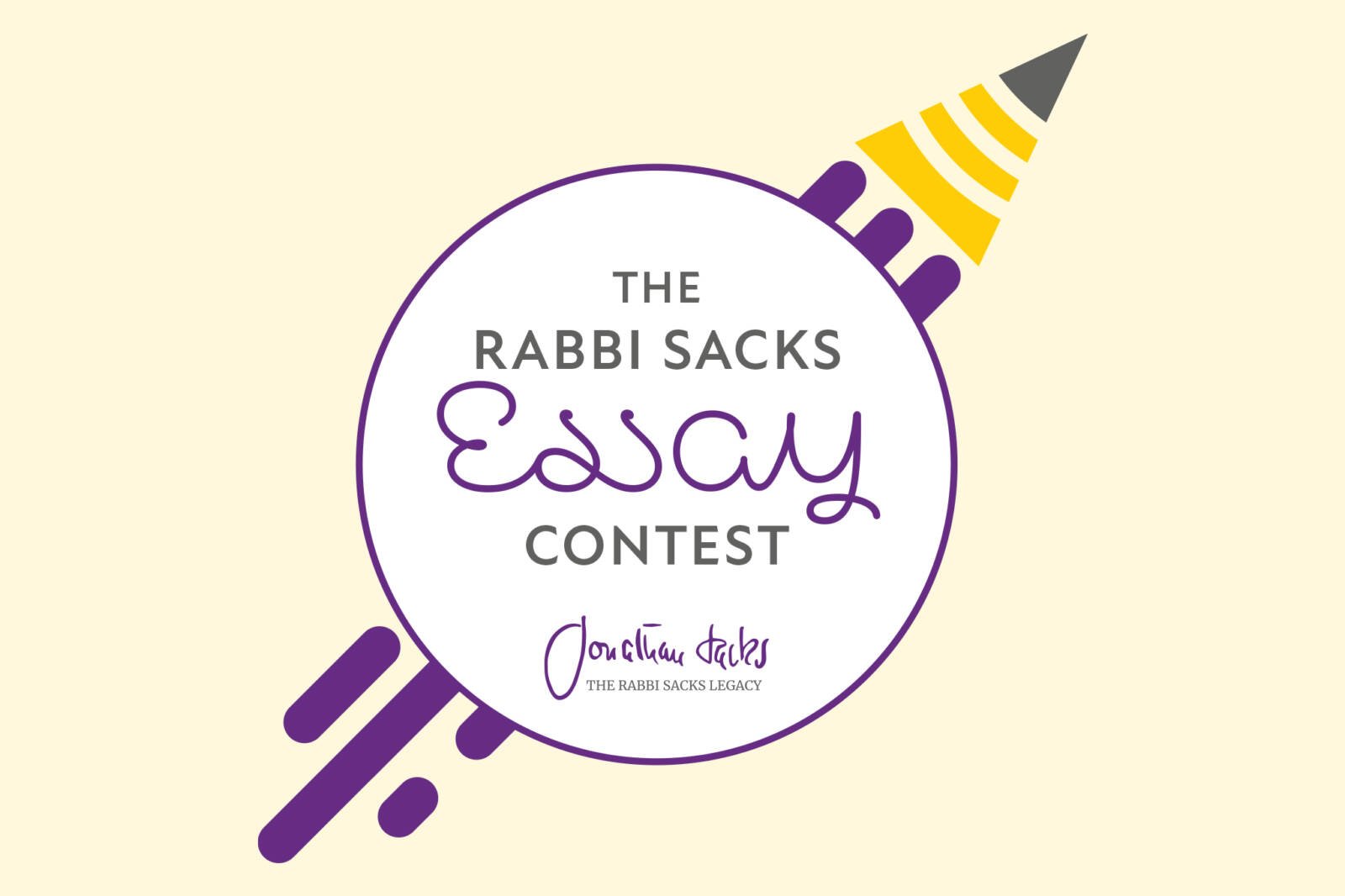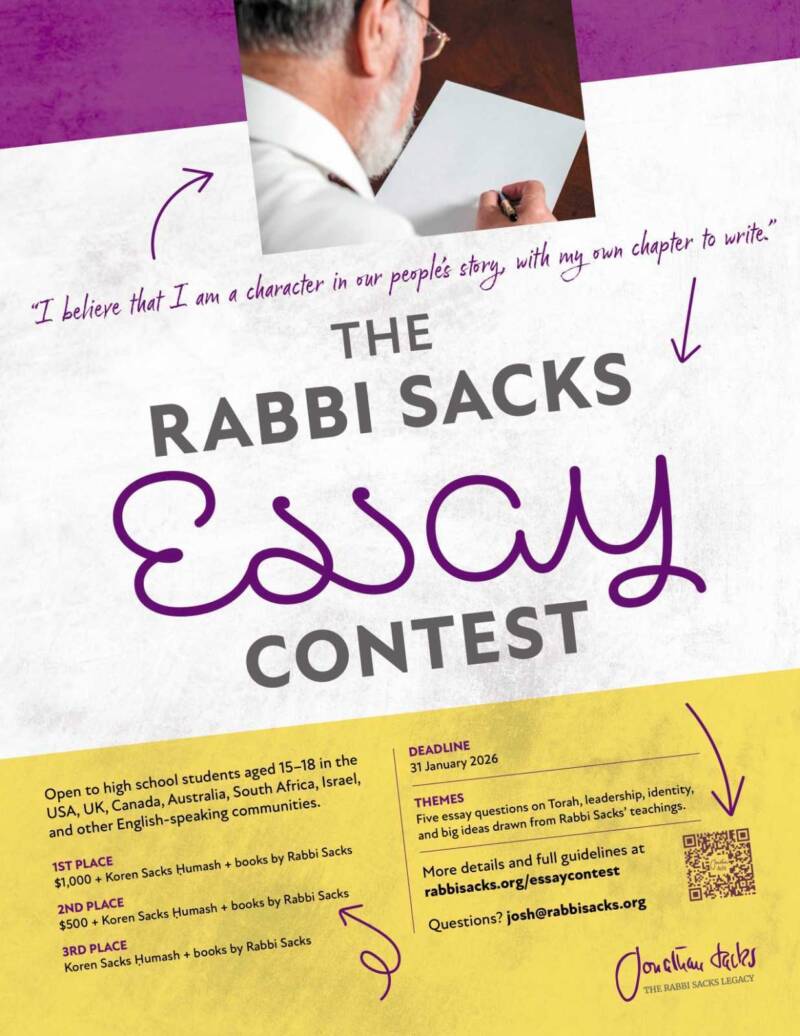The Rabbi Sacks Essay Contest 2026

“I believe that I am a character in our people’s story, with my own chapter to write, and so are we all.”
- Rabbi Lord Jonathan Sacks
As part of the global events marking Rabbi Sacks’ 5th yahrzeit in November 2025 and the launch of the Koren Sacks Humash, the Rabbi Sacks Essay Contest invites high school students to join the conversation – between Torah and life, past and present, and Rabbi Sacks’ teachings and their own experiences.
- Open to all high school students aged 15-18 across the USA, UK, Canada, Australia, South Africa, Israel, and other English-speaking communities.
- Essays will be judged by a panel from the Rabbi Sacks Legacy.
Prizes
- 1st place: $1,000 + Koren Sacks Humash + 2 additional books by Rabbi Sacks
- 2nd place: $500 + Koren Sacks Humash + 2 additional books by Rabbi Sacks
- 3rd place: A set of books by Rabbi Sacks
Join the growing list of schools whose students are participating in this year’s Rabbi Sacks Essay Contest:
Australia
Beth Rivkah Ladies College
Leibler Yavneh College
Masada College
Brazil
Escola Beit Yaacov
Canada
Baccalieu Collegiate
Bnei Akiva Schools
Hebrew Academy of Montreal
Tanenbaum CHAT
Westview Centennial Secondary School
Israel
Boyar International IB School
ישיבת חורב ירושלים - Horev Yeshiva Jerusalem
מדעי תורני כפר בתיה
United Kingdom
Hasmonean High School For Girls
JFS
United States
Bais Yaakov of Ramapo in Suffern, NY
Barkai Yeshivah High School
Cooper Yeshiva of the South
Frankel Jewish Academy
Hillel Yeshiva High School
Jewish Culture High School
Kohelet Yeshiva High School
Maimonides School
Manhattan High School for Girls
MTA
NYHS
San Marcos High School
SAR High School
The Frisch School (Yeshivat Frisch)
YULA Boys High School
How it works
Students will submit a 1,000-word essay responding to one of five questions on biblical and moral themes, relating to a Rabbi Sacks’ big idea or moral theme. The topics will be presented as questions which students will be required to explore and study utilising resources found on the Rabbi Sacks Legacy website.
To ensure fairness, all essays will be checked for originality using AI-detection tools, and a teacher in your school will be contacted to verify your essay. In addition, the top ten finalists will take part in short interviews with the judges, giving them the chance to expand on their ideas and demonstrate their personal engagement with the topic.
The essay should include the following three components. There is no requirement for the components to contain a certain number of words. However, the entire essay should amount to approximately 1,000 words for all three components.
- Rabbi Sacks and You: Explore how Rabbi Sacks would respond to the question studying and utilising resources found on the Rabbi Sacks Legacy website and providing your interpretation of Rabbi Sacks’ opinion. Outline your opinion on the matter and explain your reasoning. Note: Your opinion does not need to align with Rabbi Sacks’ opinion.
- A Story from History: Choose an example from either Jewish history or world history to support your opinion or Rabbi Sacks’ opinion on the matter. This could be a specific historical event, or a moment in history that shows why your opinion or Rabbi Sacks’ opinion makes sense. Make sure to explain how this example connects to your chosen essay topic.
- Your Story: Share a story from your own life that relates to the topic of your essay. Then explain what you have personally learned while writing the essay. How did thinking deeply about this subject affect the way you see the world or yourself?
Timeline
- 31 January 2026 - Submission deadline
- 10 March - 10 April 2026 – Runners up interviews
- May 2026 - Winners announced
Essay topics
For more details, please contact Rabbi Josh Spodek at [email protected]
Application Form

